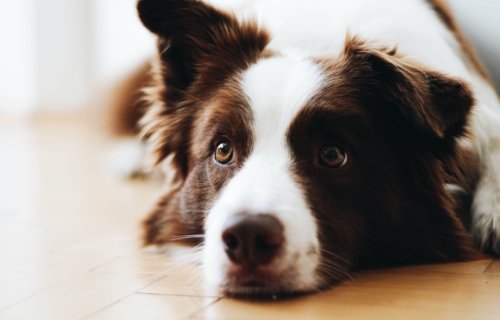HELSINKI — Dogs benefit in many ways from their keen sense of hearing, but this ability also has a few drawbacks. Anyone who has had a dog knows thunderstorms, fireworks displays, and loud neighborhood house parties can feel like the end of the world for our furry friends. Some pups, though, are particularly skittish. Beyond just noises, certain dogs are petrified of new situations, heights, and different walking surfaces. If this sounds like your canine companion, a new study from the University of Helsinki shows how to bring more peace of mind to your pooch.
Researchers say getting your dog moving and more physically active may go a long way toward alleviating those fearful characteristics. That being said, non-social fearful canine behavior appears to vary greatly depending on breed.
After conducting a behavioral survey on close to 14,000 dogs, researchers conclude that this type of fearful behavior is linked to three elements: breed, living environment, and lifestyle. Overall, though, dogs that were the most active and well trained were identified as the last fearful.
“Physical exercise has been shown to have a positive effect on the mood in both dogs and humans. As social animals, dogs enjoy doing things with their owners. At the same time, people do not necessarily wish to subject fearful dogs to training situations that are stressful for them. This can also make owners less inclined to train with their dog,” says doctoral student Emma Hakanen from the Faculty of Medicine, University of Helsinki, in a release.
Dogs that are too sheltered are also more scared
Researchers note that rarely experiencing new situations and environments is strongly linked to apprehensive behaviors in dogs. Such behaviors include being afraid of novel situations, loud noises, and different walking surfaces (slippery floors, metal grilles, transparent stairs). Conversely, more time with other dogs is linked to less instances of fearful behavior.
“Our prior research on the environmental effects of social fear observed the same phenomena where urban dogs were more fearful than their rural counterparts. Indeed, it is interesting that human mental health problems too occur more frequently in the city than in rural areas. The ways in which our environment shapes us and our best friend is definitely an interesting topic for further research,” comments Professor Hannes Lohi from the Faculty of Veterinary Medicine and Faculty of Medicine at the University of Helsinki.
Breed matters
As mentioned earlier, there were also significant observed differences among dog breeds. Cairn Terriers were named one of the most fearful breeds, while Chinese Crested Dogs were among the least fearful.
Meanwhile, Welsh Corgi Pembrokes tend to be especially afraid of loud noises, but don’t mind slippery surfaces. Labrador Retrievers and Chihuahuas also don’t seem to be very sensitive to noises.
“The breed-specific differences support the idea that fearfulness is inherited. In other words, breeding choices matter, even without knowing the exact mechanisms of inheritance. However, this study offers dog owners tools and support for previous notions related to improving the wellbeing of their dogs. Diverse socialization in puppyhood and an active lifestyle can significantly reduce social and non-social fearfulness,” Lohi concludes.
The study is published in Scientific Reports.
Like studies? Follow us on Facebook!
